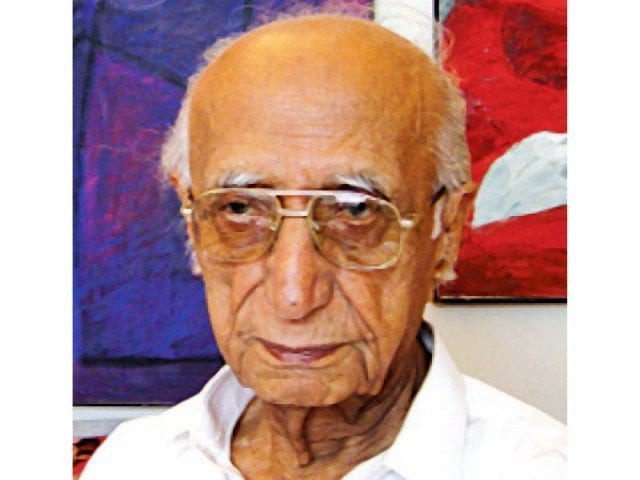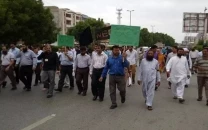Sindhi literary giant Ibrahim Joyo passes away
Scholar, writer and educationist was 102 years old

PHOTO: FILE
The funeral prayers of the literary giant were attended by hundreds of protegés, contemporaries, admirers, politicians and educationists, besides family and were offered in a complex of tombs of the Kalhoro dynasty in Hyderabad. The late luminary was buried alongside Allama II Kazi in Sindh University, Jamshoro.
"My lifelong contributions to the fields of learning, writing, teaching and education have been my political services for the people," he had said in an interview a few years ago. Joyo authored, translated and edited hundreds of books and kept contributing articles to a Sindhi newspaper till August, 2016. He headed and remained associated with various government and private organisations.
"In the 1950s Joyo emerged as a secular mind when the movement for Sindh's rights and peasants were attaining their peak," observed Dr Riaz Ahmed, head of the social sciences department at the Shaheed Zulfikar Ali Bhutto Institute of Science and Technology.
Not gone: Jaun Elia’s ideas still reverberating in the hearts of the young
Ahmed Solangi, general secretary of the Sindhi Adabi Sangat [literary fraternity], which announced a week-long mourning for Joyo’s death, remembered him as a guiding light and teacher. Sindhi Language Authority Chairperson Prof Dr Abdul Ghafoor Memon credited Joyo for introducing science and reason to Sindhi readers via his writings. "He was an institution making person who introduced modern progressive literature," he said.
Senator Sassui Palijo said in her condolence message, "Ibrahim Joyo was an institution who nurtured our country’s progressive thought with his work in the fields of education, history and literature". "We have lost a humble scholar, who in one of his last interviews, called himself a passionate learner," said Prof Dr Fateh Muhammad Burfat, vice-chancellor of Sindh University.
Joyo was born on August 13, 1915 in Abad village in present day Jamshoro district to a farmer. He acquired his early education from local schools and passed his matriculation in 1934 with a distinction from Sindh Madrassatul Islam (SMI). After graduating from DJ College, Karachi in 1938, he started teaching at SMI.
He completed his Bachelor’s in teaching degree from Bombay, India, in 1941, and, on his return, rejoined SMI, where he worked till 1947. He wrote his first literary essay, 'Birds of a Cage', in Sindhi when he was 14 years old. In 1946, SMI's magazine published his English essay 'Democracy in School Administration'.
Celebrating a legend: A tribute to Ibrahim Joyo’s progressive thinking
Joyo was inspired by two thinkers and politicians - GM Syed and MN Roy. He became part of the latter's Radical Democratic Party. Joyo also translated Roy's book 'Historical Role of Islam' into Sindhi. He was sacked from service at SMI by the then education minister after he authored the book 'Save Sindh, Save Subcontinent from Lords, Capitalists and Communalists'.
But, he again found employment in a municipal high school in Thatta district where he worked for two years. He later joined the teachers' training college for men in Hyderabad as an assistant teacher. In 1951, he was appointed secretary of the High Powered Executive Committee for Sindhi Literature, which was renamed the Sindhi Adabi Board in 1954. He headed the board till 1961 and it was this era which produced modern Sindhi literature with Joyo being one of vanguards of the renaissance movement.
From 1963 to 1967, he served in the Pakistan Textbook Board and was posted in Karachi, Lahore, Quetta and Hyderabad. During the same period, he remained an honorary secretary of the Sindhi Adabi Board.
His essay, 'Issues of Languages in Western Pakistan', written under a pseudonym in 1967, provoked the government and he was sent to a remote area in Jacobabad district to head a government school. He was against transferred to Kohat, Balochistan to head another government school for two years.
Sindh’s crusader for girls' education Dadi Leelan passes away
A few years later in 1971 he was appointed a member of the Sindh Textbook Board and in 1972 deputy director of the Bureau of Curriculum and Extension. He retired from service in August, 1973 and in the same year he founded an organisation dedicated to literature. He also headed or remained associated with the Sindhi Writers Coordination Fraternity, Sindh Friends Circle, Servants of Sindh Society, Sindh Education Trust, Sindhi Adabi Board, Sindhi Language Authority, Shaikh Ayaz Foundation and Shaikh Ayaz Chair in Shah Abdul Latif University Khairpur.
Joyo has written 52 books, including translations of Rousseau, Plutarch, Voltaire, Paulo Freire, TS Elliot, Shelley, Rabindranath Tagore, Stefan Zweig and Francis Bacon. He also edited at least 50 books of writers and poets likes Shaikh Ayaz and revolutionary nationalist leader Syed. Drama, folk stories, history, politics, women rights, sufi saints, language and religion feature as the subjects of his work.
“I love all the books that I have written or edited because I did this work out of passion, not as a source of income,” he had said in an interview. Joyo claimed he liked his translated book, ‘Wehshi Jeewat Ja Nishan [Savage Survivals]’ the most.
Have something to add to the story? Share it in the comments below.



















COMMENTS
Comments are moderated and generally will be posted if they are on-topic and not abusive.
For more information, please see our Comments FAQ